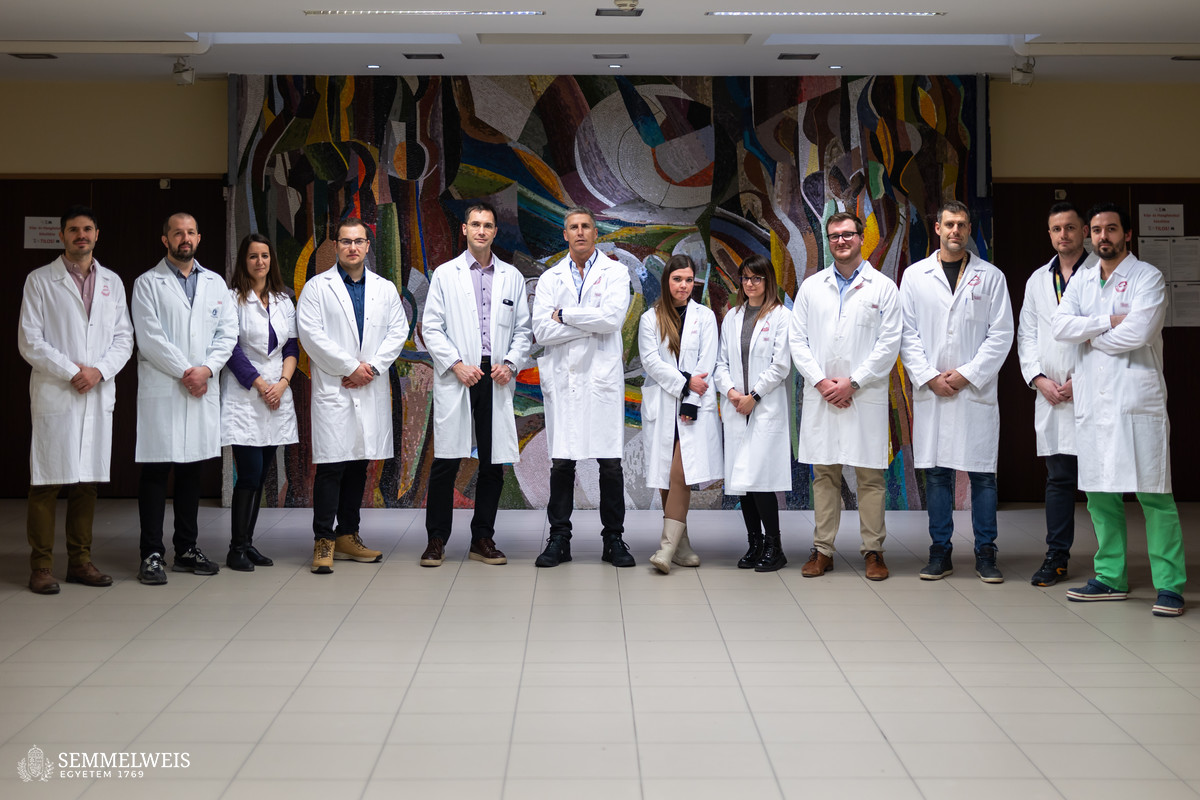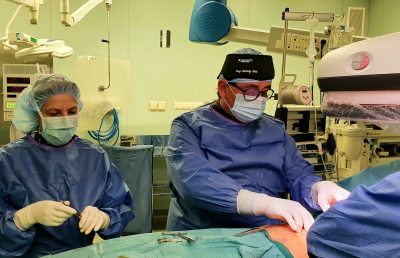The European Society of Gynecological Oncology (ESGO) analyzed the performance of the oncology working group of Semmelweis University’s Department of the Obstetrics and Gynecology during the strict accreditation process going back three years before awarding it in November 2023 with the “ESGO Accredited Center in Advanced Ovarian Cancer Surgery and Endometrial Cancer Surgery” accreditations. Currently, only Semmelweis University holds the joint accreditation of the two specializations in Hungary, said Dr. Szabolcs Máté, chief physician of the Gynecological Oncology and Tumor Surgery Unit of the Department of Obstetrics and Gynecology. Endometrial cancer is currently the most common gynecological tumor, and the number of cases is constantly increasing. Although ovarian cancer is not the most common type, it is the gynecological tumor with the highest mortality rate, causing an average of 700 deaths per year in Hungary. Therefore, as he emphasized, it is particularly important that we can treat these diseases with excellent quality. Besides the National Institute of Oncology, Semmelweis University’s clinic is currently the second largest patient care institution in the country in the field of gynecological oncology and tumor surgery.
The surgical oncology units of the clinic’s Baross and Üllői Street clinics took part in the accreditation procedures, the former are led by Dr. Szabolcs Máté, the latter by Dr. Balázs Lintner. Attaining the certification was preceded by concentrated organizational work, close adherence to professional guidelines, continuous training and expansion of the centers’ reputation and professional relationships, according to the head of the unit. In both accreditation procedures, it is important to meet other requirements in addition to the quantitative indicators related to the number of patients and the quality of patient care, including the appropriate documentation of surgeries, pathological findings, and pre-operative examinations, as well as multidisciplinary decision-making based on these in accordance with international protocols. Participation in prospective clinical research in the field is also a requirement for obtaining these accreditations, as is the fact that a tumor patient can only be operated on by a certified surgeon oncologist.

In addition to the routine use of minimally invasive surgical methods and the sentinel lymph node technique, it is extremely important in the surgical care of endometrial tumors to prepare an individualized treatment plan while taking into account not only the histological type of the tumor, but also its molecular profile. In the surgical care of ovarian tumors detected in an advanced stage, complete tumor removal is the most important, which can be achieved with the help of extended abdominal surgery. These operations require extensive expertise and often the involvement of associate professions, such as surgeons. “In recent years, the number of our doctors participating in surgical oncology training and successfully passing the specialist exam has been continuously increasing, and this year we also welcomed an experienced clinical oncologist colleague. Being a professional training center, we also accept medical candidates from other institutions,” highlighted Dr. Balázs Lintner.
Oncology centers play an extremely important role. Just as in the case of many other diseases, centralization is also a basic requirement for the quality care of malignant tumors, as only the centers can provide all the personal and material conditions, as well as the accumulated knowledge, which is state-of-the-art and gives the patients the best chances of recovery, the heads of units emphasized. The Gynecological Oncology Center of Semmelweis University provides complex care: depending on the diagnosis, from organ-sparing (fertility-preserving) surgeries to ultra-radical oncological surgeries, available treatments include endoscopic techniques, hysteroscopic, laparoscopic, robot-assisted surgeries, as well as intra-abdominal chemotherapy (HIPEC) developed for the treatment of diseases involving the peritoneum). The two units perform an average of 10-15 oncological surgeries per week. In the oncology unit of the Baross Street clinic, in addition to traditional chemotherapy, modern targeted and immunotherapy treatments are also performed in a constantly increasing number, currently around 30 treatments are performed per week. “In addition to surgeries, the development of drug therapies also justifies centralization. In the past few years, modern drugs have revolutionized the treatment of certain tumors, giving doctors the opportunity for unprecedented success,” said Dr. Szabolcs Máté.
For the patients, the obtained accreditations mean that they can count on examination and treatment principles in accordance with international standards at the clinic, not only for the two above-mentioned but for all gynecological tumors. In such a center, care is duly organized through pre-established collaborations, in a controlled manner and efficiently scheduled, clinical specialist Dr. Richárd Tóth pointed out. Associate professions significant for oncology care are available at Semmelweis University in excellent quality. Our anesthesiologist and intensive care, radiologist and pathologist colleagues are indispensable in our daily work, added Dr. Szabolcs Máté.
Besides the recognition of their professional work, obtaining the two accreditations is also important because it provides opportunity to participate in multicenter trials conducted in cooperation with ESGO accredited centers. However, the center’s specialists continue to focus on improving the quality of patient care in terms of equipment, surgical capacity and expertise. Their long-term plans include obtaining the title of accredited ESGO Center for Training.
Melinda Katalin Kiss
Translation: Mária Sánta
Photo: Bálint Barta – Semmelweis University


